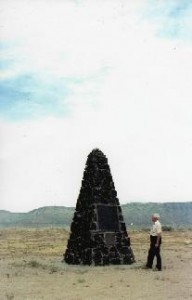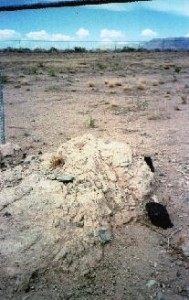The Sixty-Fifth Anniversary of the Nuclear Age
Jul. 16, 2010
by David Krieger
July 16, 1945 marked the beginning of the Nuclear Age. On that day, the United States conducted the first explosive test of an atomic device. The test was code-named Trinity and took place at the Alamogordo Test Range in New Mexico's Jornada del Muerto Desert. The bomb itself was code-named "The Gadget."
The Trinity test used a plutonium implosion device, the same type of weapon that would be used on the city of Nagasaki just three and a half weeks later. It had the explosive force of 20 kilotons of TNT.
The names associated with the test deserve reflection. "The Gadget," something so simple and innocuous, was exploded in a desert whose name in Spanish means "Journey of Death." Plutonium, the explosive force in the bomb, was named for Pluto, the Roman god of the underworld. The isotope of plutonium that was used in the bomb, plutonium-239, is one of the most deadly radioactive materials on the planet. It existed only in minute quantities on Earth before the US began creating it for use in its bombs by the fissioning of uranium-238.
There is no definitive explanation for why the test was named Trinity, but it generally seems most associated with a religious concept of God. The thoughts of J. Robert Oppenheimer, the scientific director of the project to create the bomb and the person who named the test, provide insights into the name:
"Why I chose the name is not clear, but I know what thoughts were in my mind. There is a poem of John Donne, written just before his death, which I know and love. From it a quotation: 'As West and East / In all flatt Maps—and I am one—are one, / So death doth touch the Resurrection.' That still does not make a Trinity, but in another, better known devotional poem Donne opens, 'Batter my heart, three person'd God.'"
Oppenheimer's reaction to witnessing the explosion of the atomic device was to recall these lines from the Bhagavad Gita:
If the radiance of a thousand suns
Were to burst at once into the sky,
That would be like the splendor of the Mighty One...
I am become Death,
The shatterer of Worlds.
Did Oppenheimer think that he had become death that day, or that all of us had? Certainly that first nuclear explosion portended the possibility that worlds would be shattered (by a "Mighty One"?), as they were soon to be in Hiroshima and Nagasaki.
This year marks the 65th anniversary of the Trinity test. We are now 65 years into the Nuclear Age. At Hiroshima and Nagasaki we have seen the devastation that nuclear weapons can inflict on cities and their inhabitants. We have witnessed a truly mad arms race between the United States and the former Soviet Union, in which the number of nuclear weapons in the world rose to 70,000. We have learned that one nuclear weapon can destroy a city, a few nuclear weapons can destroy a country, and a nuclear war could destroy civilization and most of the complex life forms on the planet.
Nuclear weapons have endangered the human species, and yet today there are still more than 20,000 nuclear weapons in the world. Nine countries now possess these weapons. Humanity is still playing with the fire of omnicide – the death of all. We are still waiting for the leaders who will take us beyond this overarching threat to our common future. Instead of continuing to wait, we must ourselves become these leaders.
On this 65th anniversary of embarking on the Journey of Death, we must change course and move back from the nuclear precipice. The weapons are illegal, immoral, undemocratic and militarily unnecessary. The surest way to bring them under control is by negotiating a new treaty, a Nuclear Weapons Convention, for the phased, verifiable, irreversible and transparent elimination of nuclear weapons.
The United States led the world into the Nuclear Age. President Obama has pointed out that the country also has a moral responsibility to lead the way out. This can be done, but not with a citizenry that is ignorant, apathetic and in denial. Sixty-five years on the Journey of Death is long enough. It is past time for citizens to awaken and become engaged in this issue as if their future depended upon it, as it does.
The fervent prayer of the hibakusha, the survivors of Hiroshima and Nagasaki, is "Never Again!" They speak out so that their past does not become our future. It is a prayer that each of us must join in answering, both with our voices and actions to achieve a world free of nuclear weapons.
David Krieger is President of the Nuclear Age Peace Foundation (www.wagingpeace.org), an organization that has worked for the abolition of nuclear weapons since 1982.
July 16, 1945 marked the beginning of the Nuclear Age. On that day, the United States conducted the first explosive test of an atomic device. The test was code-named Trinity and took place at the Alamogordo Test Range in New Mexico's Jornada del Muerto Desert. The bomb itself was code-named "The Gadget."
The Trinity test used a plutonium implosion device, the same type of weapon that would be used on the city of Nagasaki just three and a half weeks later. It had the explosive force of 20 kilotons of TNT.
The names associated with the test deserve reflection. "The Gadget," something so simple and innocuous, was exploded in a desert whose name in Spanish means "Journey of Death." Plutonium, the explosive force in the bomb, was named for Pluto, the Roman god of the underworld. The isotope of plutonium that was used in the bomb, plutonium-239, is one of the most deadly radioactive materials on the planet. It existed only in minute quantities on Earth before the US began creating it for use in its bombs by the fissioning of uranium-238.
There is no definitive explanation for why the test was named Trinity, but it generally seems most associated with a religious concept of God. The thoughts of J. Robert Oppenheimer, the scientific director of the project to create the bomb and the person who named the test, provide insights into the name:
"Why I chose the name is not clear, but I know what thoughts were in my mind. There is a poem of John Donne, written just before his death, which I know and love. From it a quotation: 'As West and East / In all flatt Maps—and I am one—are one, / So death doth touch the Resurrection.' That still does not make a Trinity, but in another, better known devotional poem Donne opens, 'Batter my heart, three person'd God.'"
Oppenheimer's reaction to witnessing the explosion of the atomic device was to recall these lines from the Bhagavad Gita:
If the radiance of a thousand suns
Were to burst at once into the sky,
That would be like the splendor of the Mighty One...
I am become Death,
The shatterer of Worlds.
Did Oppenheimer think that he had become death that day, or that all of us had? Certainly that first nuclear explosion portended the possibility that worlds would be shattered (by a "Mighty One"?), as they were soon to be in Hiroshima and Nagasaki.
This year marks the 65th anniversary of the Trinity test. We are now 65 years into the Nuclear Age. At Hiroshima and Nagasaki we have seen the devastation that nuclear weapons can inflict on cities and their inhabitants. We have witnessed a truly mad arms race between the United States and the former Soviet Union, in which the number of nuclear weapons in the world rose to 70,000. We have learned that one nuclear weapon can destroy a city, a few nuclear weapons can destroy a country, and a nuclear war could destroy civilization and most of the complex life forms on the planet.
Nuclear weapons have endangered the human species, and yet today there are still more than 20,000 nuclear weapons in the world. Nine countries now possess these weapons. Humanity is still playing with the fire of omnicide – the death of all. We are still waiting for the leaders who will take us beyond this overarching threat to our common future. Instead of continuing to wait, we must ourselves become these leaders.
On this 65th anniversary of embarking on the Journey of Death, we must change course and move back from the nuclear precipice. The weapons are illegal, immoral, undemocratic and militarily unnecessary. The surest way to bring them under control is by negotiating a new treaty, a Nuclear Weapons Convention, for the phased, verifiable, irreversible and transparent elimination of nuclear weapons.
The United States led the world into the Nuclear Age. President Obama has pointed out that the country also has a moral responsibility to lead the way out. This can be done, but not with a citizenry that is ignorant, apathetic and in denial. Sixty-five years on the Journey of Death is long enough. It is past time for citizens to awaken and become engaged in this issue as if their future depended upon it, as it does.
The fervent prayer of the hibakusha, the survivors of Hiroshima and Nagasaki, is "Never Again!" They speak out so that their past does not become our future. It is a prayer that each of us must join in answering, both with our voices and actions to achieve a world free of nuclear weapons.
David Krieger is President of the Nuclear Age Peace Foundation (www.wagingpeace.org), an organization that has worked for the abolition of nuclear weapons since 1982.








